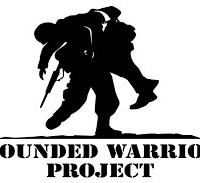Wounded Warrior Project to continue filling gaps in FY2017
- Details
- Published on Monday, 03 October 2016 16:35
- Written by PRNewswire
Having recently surpassed its monumental goal of serving more than 2,500 post-9/11 combat warriors – including their families and caregivers – through its mental health programs and services in its 2016 fiscal year, Wounded Warrior Project®(WWP) is kicking off its 2017 fiscal year with a continued focus on filling the gaps in mental health support.
During 2016 Mental Health Awareness Week, Oct. 2-8, WWP is raising awareness about mental health, reducing the stigmas associated with invisible wounds of war, and appealing to wounded warriors suffering in silence to seek the help they earned.
"Mental health awareness is especially important for veterans because we are not used to asking for help, which can cause an increase in family issues, violence, substance abuse, homelessness, and suicide," said Rebecca Benton, a U.S. Navy wounded warrior from Orlando, Florida, who recently attended a four-day mental health rehabilitative workshop in Long Creek, South Carolina.
This week, across the nation, injured warriors will be working with WWP to share their stories with America through the WWP News Room and respective local media outlets. Many of these experiences are being shared with the public for the first time in an effort to form a united battle cry that informs veterans dealing with invisible wounds of war about available programs and services – the same that have worked for those telling the stories personally.
"Seeking treatment is not as easy as it may seem," said Ryan Kules, WWP combat stress recovery director. "Many suffer in silence with mental health conditions, but by increasing both the awareness of the stigmas associated with these injuries and the reach of our mental health services, warriors will see firsthand that invisible injuries are not a life sentence, and they can be managed."
WWP created its Combat Stress Recovery Program (CSRP) to address the growing mental health needs of warriors who return from war with invisible wounds. Through the generous support of donors, CSRP offers veterans a range of specialized programs and services – each tailored to the veteran's specific needs – all free of charge. WWP and its supporters believe warriors already paid their dues on the battlefield, so warriors don't pay for any service they receive. WWP plans to continue to bolster its mental health focus in the next fiscal year, innovating its current programs and services based on direct feedback from the wounded warriors they serve.
Exposure to traumatic combat and operational experiences affects service members and veterans spiritually, psychologically, biologically, and socially. Although challenging, WWP's multi-day mental health rehabilitative opportunities provide safe, private environments for warriors to express themselves and share their combat action – with laughter and tears. At the end of the transformative program, warriors share lessons learned from the activities that impacted their personal struggles the most and set achievable goals for their recoveries.
"WWP program gatherings provide opportunities to build supportive communities with other veterans to help with the readjustment and transitioning issues many of us face," Rebecca said. "They are also good places to reduce the feelings of isolation, have open discussions, and build a support team of battle buddies."
To date, an estimated 400,000 service members live with invisible wounds of war, including combat stress, depression, post-traumatic stress disorder (PTSD), and traumatic brain injury (TBI). According to a report released by Institute of Medicine in 2014, 47 percent of veterans diagnosed with PTSD in 2013 after serving in Iraq and Afghanistan did not receive treatment.
Rebecca's experience is a testament to the success of WWP mental health programs and services.
"WWP's mental health workshop was not a vacation or getaway by any means. I was challenged and left emotionally and physically drained, but a stronger person than I was four days prior. I was able to work on built-up emotions from my active duty service and my transition to civilian life," Rebecca said. "I faced my fears and emotions and talked about them with other veterans – some I had just met. I learned to build trust with strangers. I learned more about myself and how to be more resilient – despite some of my past struggles. These opportunities are about self-care, working on mental health, not being afraid to ask for help, and learning we are not alone in this journey – others have similar stories. Because I attended this mental health program, I have more resources and battle buddies to carry me through. I am forever grateful to Wounded Warrior Project and its staff."


















































